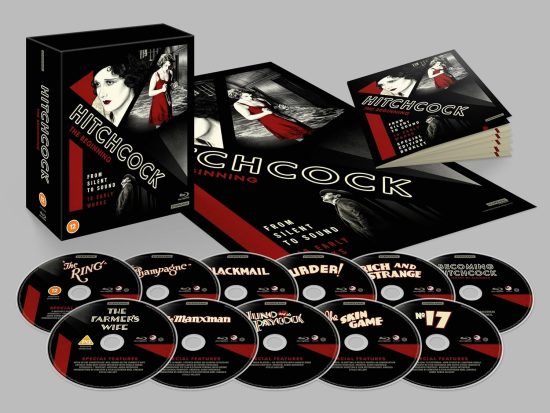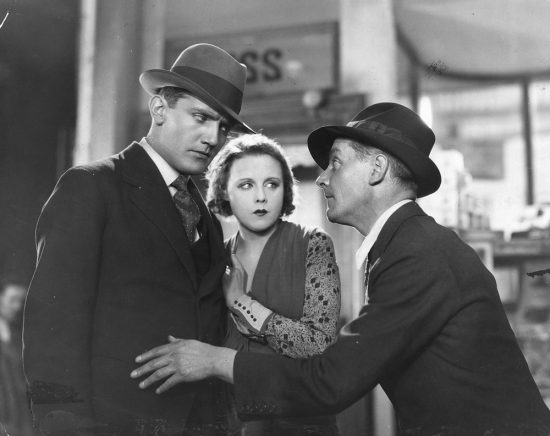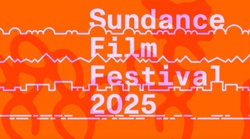Review: Hitchcock – The Beginning – “a remarkable journey through the formative years of Alfred Hitchcock.”
The Hitchcock: The Beginning Blu-ray box set is a remarkable journey through the formative years of Alfred Hitchcock, showcasing his evolution from silent films to the dawn of sound cinema. This collection is not just a retrospective; it’s a masterclass in the development of one of cinema’s greatest storytellers.
First off, let’s talk about the sheer breadth of this 11-disc set. It features ten early works, including gems like The Ring and Blackmail, which are pivotal in understanding Hitchcock’s artistic trajectory. It does not include the silent films The Pleasure Garden, The Lodger, Downhill and Easy Virtue, or the early sound film, Waltzes from Vienna.
The restorations of the films included are nothing short of stunning, breathing new life into these classics. Each film is accompanied by insightful extras, including audio commentaries and archival interviews that deepen our appreciation for Hitchcock’s craft.
As I watched these films, I was struck by how they reflect Hitchcock’s unique style emerging from the constraints of early cinema. For instance, The Ring (1927) showcases his inventive use of visual storytelling, even if the narrative itself occasionally feels like a familiar love triangle. It’s in these moments that we see Hitchcock experimenting with techniques that would define his later work—distorted POV shots and haunting imagery abound.
Blackmail (1929) is a pivotal film in Alfred Hitchcock’s career, marking his transition into the realm of sound cinema and showcasing his innovative storytelling techniques. As the first British sound feature, it brilliantly utilises sound to enhance the narrative, creating an atmosphere of tension and suspense that keeps viewers on edge. The film follows a woman who, after killing her would-be rapist, becomes entangled in a web of deceit and moral ambiguity. Hitchcock’s masterful use of visual storytelling, combined with striking performances—particularly from Anny Ondra—highlights his emerging “Hitchcock Touch.” The film’s expressionist style and clever sound design demonstrate how Hitchcock was not just adapting to new technology but was also pushing its boundaries to create a richer cinematic experience. The ending in the British Museum reminded me of the Mount Rushmore scenes in North by Northwest.
The accompanying documentary in the Hitchcock: The Beginning box set further enriches this viewing experience, offering insights into how Blackmail laid the groundwork for many of Hitchcock’s later masterpieces. Overall, Blackmail is a compelling blend of suspense and innovation that remains a cornerstone of Hitchcock’s legacy.
Then there’s Champagne (1928), which surprised me with its charm. Despite its light plot, it captures a playful spirit that feels refreshing amidst the more serious tones of other films in this collection. It’s delightful to witness Hitchcock’s ability to weave humour into his narratives, something often overshadowed by his suspenseful thrillers.
However, not every film in this set hits the mark equally. The Farmer’s Wife (1928) left me feeling somewhat underwhelmed. While it has its moments, it lacks the stylistic flair we’ve come to associate with Hitchcock. Yet, this inconsistency only adds to the intrigue of watching his early works—each film is a stepping stone in his artistic journey.
One of the standout features is the newly commissioned documentary, Becoming Hitchcock – The Legacy of Blackmail. Directed by Laurent Bouzereau and narrated by Elvis Mitchell, this 72-minute exploration dives into the making of Blackmail, Hitchcock’s first sound film. It’s fascinating to see how he harnessed the potential of sound in ways that were revolutionary for his time. The documentary highlights how Blackmail not only marked a turning point in Hitchcock’s career but also laid the groundwork for themes that would become synonymous with his later masterpieces.
This box set is a treasure trove for any film lover or aspiring historian. It invites us to witness not just the evolution of a filmmaker but also the birth of cinematic language itself. As I reflected on Hitchcock’s journey through these films, I couldn’t help but feel a sense of connection to my own experiences—how we all grow and change over time, often in unexpected ways.
In conclusion, Hitchcock: The Beginning is an essential addition to any cinephile’s collection. It serves as both an introduction to Hitchcock’s early works and a reminder of how innovation can emerge from the simplest ideas. So grab your popcorn, settle into your favourite chair, and prepare for an enlightening journey through the early days of one of cinema’s most iconic figures.
Hitchcock: The Beginning is out on 16th December 2024. You can pre-order it here.
Thank you for supporting Live for Films (LFF) when you order using an affiliate link. As an Amazon Associate LFF earns from qualifying purchases. If you are using an adblocker you will not see the link.
Below are the films and extras included in the box set.
- THE RING (1927)
A Knockout Score: Neil Brand on The Ring
Hitchcock/Truffaut: Archival Audio Interview
Introduction by Director / Film Historian Noël Simsolo
Stills Gallery - THE FARMER’S WIFE (1928)
Hitch in the Countryside: Neil Brand on The Farmer’s Wife
Extract from BEHP audio interview with Ronald Neame
Hitchcock/Truffaut: archival audio interview
Introduction by Director / Film Historian Noël Simsolo
Stills Gallery - CHAMPAGNE (1928)
Hitch & Champagne: Neil Brand on music for Silent Film
A Heady Cocktail: Charles Barr on Champagne
Hitchcock/Truffaut: archival audio interview
Audio commentary by film historian Farran Smith Nehme
Introduction by Director / Film Historian Noël Simsolo
Stills Gallery - THE MANXMAN (1929)
Melodrama à la Manx: Stephen Horne on scoring Hitchcock
Hitch’s Leading Ladies by Davina Quinliven
Audio commentary by film historian Farran Smith Nehme
Hitchcock/Truffaut: archival audio interview
Introduction by Director / Film Historian Noël Simsolo
Stills Gallery - BLACKMAIL (1929)
Silent into Sound: Neil Brand on Blackmail
Anny Ondra’s Screen Test
Extract from BEHP audio interview with Ronald Neame
Audio Commentary by Film Historian Tim Lucas
Hitchcock/Truffaut: archival audio interview
Introduction by Director / Film Historian Noël Simsolo
Stills Gallery - JUNO & THE PAYCOCK (1930)
Hitch & The Irish Players – An Interview with Charles Barr
Hitchcock/Truffaut: archival audio interview
Stills Gallery - MURDER! (1930)
MARY: 1931 German version of ‘Murder! ‘
Alternate Ending
Audio Commentary by film critic Nick Pinkerton
Hitchcock/Truffaut: archival audio interview
Introduction by Director / Film Historian Noël Simsolo
Stills Gallery - THE SKIN GAME (1931)
Alma Reville: Jo Botting & Natalie Morris in Conversation
Hitchcock/Truffaut: archival audio interview
Introduction by Director / Film Historian Noël Simsolo
Stills Gallery - RICH AND STRANGE (1931)
Unexpectedly Personal: Charles Barr on Rich and Strange
Audio Commentary by film historian Troy Howarth
Hitchcock/Truffaut: archival audio interview
Introduction by Director / Film Historian Noël Simsolo
Stills Gallery - NUMBER SEVENTEEN (1932)
From Silent Film Idol to Superman: John Stuart by Jonathan Croall
Audio Commentary by film historian and critic Peter Tonguette
Hitchcock/Truffaut: archival audio interview
Introduction by Director / Film Historian Noël Simsolo
Lobby Cards Gallery











